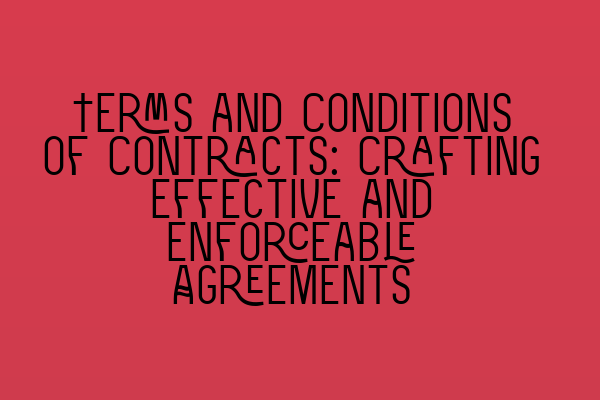Terms and Conditions of Contracts: Crafting Effective and Enforceable Agreements
Introduction:
When it comes to entering into contracts, the terms and conditions are the foundation of a legally binding agreement. Crafting effective and enforceable terms and conditions is a crucial aspect of contract law that should not be taken lightly. As a solicitor specializing in contract law, I understand the importance of creating comprehensive and legally sound terms and conditions. In this blog post, I will guide you through the process of drafting effective and enforceable terms and conditions for your contracts. So, let’s dive right in!
1. Understanding the Purpose of Terms and Conditions:
The terms and conditions of a contract set out the rights, obligations, and responsibilities of the parties involved. They provide clarity and certainty to both parties, ensuring that their expectations are met and disputes are minimized. It is essential to clearly define key elements such as payment terms, delivery obligations, intellectual property rights, dispute resolution mechanisms, and any limitations of liability.
2. Tailoring Terms and Conditions to Your Specific Needs:
Every contract is unique, and your terms and conditions should reflect the specific requirements of your business or industry. Consider:
– Clearly defining the goods or services being provided
– Stating the price and payment terms, including any penalties or late fees
– Outlining the timeline for delivery or completion
– Identifying any warranties or guarantees provided
– Addressing confidentiality and data protection matters
– Including provisions for termination, renewal, and amendment of the contract
3. Using Clear and Precise Language:
Clarity is paramount when drafting terms and conditions to ensure that both parties understand their obligations without ambiguity. Avoid using legal jargon or complex language that may confuse the average reader. Instead, use simple and concise wording that is easy to comprehend. This helps to avoid any potential misunderstandings or disputes down the line.
4. Ensuring Enforceability:
For terms and conditions to be enforceable, they must be fair, reasonable, and in line with applicable laws and regulations. Avoid any terms that may be deemed unfair or oppressive, as they may be unenforceable or even attract legal consequences. Seek legal advice to ensure your terms and conditions comply with the law and the specific nature of your business.
5. Updating and Reviewing Terms and Conditions:
Contracts are not static documents; they evolve with time. It is crucial to regularly review and update your terms and conditions to keep up with changes in the law, industry standards, or your business practices. Failure to review and update your terms and conditions can leave you exposed to legal risks and potential disputes.
Conclusion:
Crafting effective and enforceable terms and conditions is a vital aspect of contract law. Taking the time to carefully consider and tailor your terms and conditions to your specific needs can help protect your rights and minimize the risk of disputes. Remember to use clear and precise language, ensure enforceability, and regularly review and update your terms and conditions. If you need professional assistance with drafting or reviewing your terms and conditions, don’t hesitate to reach out to SQE Contract Law. We have the expertise and experience to help you navigate the complex world of contracts.
Disclaimer: The information provided in this blog post is for general informational purposes only and does not constitute legal advice. For specific legal advice regarding your contracts, please consult a qualified solicitor.
Keywords: terms and conditions, contracts, crafting effective, enforceable agreements, contract law, solicitor, legally binding agreement, comprehensive, rights, obligations, responsibilities, clarity, expectations, disputes, payment terms, delivery obligations, intellectual property rights, limitations of liability, tailoring, specific needs, goods, services, price, timeline, warranties, termination, renewal, amendment, clear language, understanding, fair, reasonable, compliance, reviewing, updating, legal risks, disputes, professional assistance, SQE Contract Law, legal advice.
